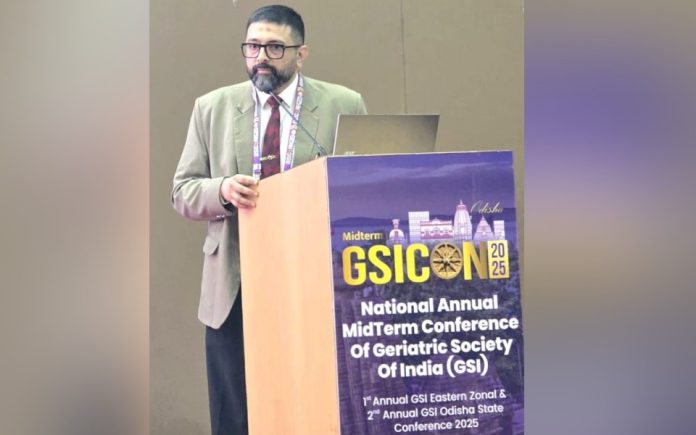Bhubaneswar– Dr Haroon Hussain, senior physician at the Department of Medicine, KMC Hospital, Mangaluru, delivered a compelling talk on “Living Will and Pathways to Making Advance Medical Directive” during the National Midterm Conference of the Geriatric Society of India (GSI), held from June 20 to 22 in Bhubaneswar, reported the Varta Bharati.
Organised by GSI, a leading body dedicated to the well-being of India’s elderly population, the conference brought together medical professionals and experts from across the country to address emerging challenges and innovations in geriatric healthcare.
In his session on Medical Law and Ethics, Dr Haroon addressed the often-overlooked subject of end-of-life care. “In India, death remains a taboo topic, often shrouded in superstition. But it’s important to understand that dying is a process, not just an event,” he said, emphasising the psychological and social impact this phase has on both patients and their families.
Dr Haroon advocated for Advance Care Planning (ACP), describing it as a continuous, sensitive dialogue between patients, families, and doctors, rather than a one-time legal formality. He explained the ethical principles that guide such care—autonomy, beneficence, non-maleficence, and justice—and how they help uphold patient dignity and rights.
Highlighting the 2018 Supreme Court ruling in the Common Cause vs Union of India case, he explained how it gave legal validity to the concept of a Living Will or Advance Medical Directive (AMD). This allows individuals to legally declare their preferences for medical treatment in case they become terminally ill or unable to communicate.
Dr Haroon also discussed the 2023 procedural amendments, which made it easier to implement Advance Directives. He detailed how hospitals are now required to form a Primary Medical Board (PMB) and a Secondary Medical Board, both of which must review and decide on the patient’s condition within a specified time frame, before communicating the decision to the Judicial Magistrate First Class (JMFC).
He urged that patient wishes outlined in the AMD be respected without exception. “If a patient has refused a treatment, it should not be imposed. Instead, the focus should move to holistic palliative care—managing symptoms, providing emotional support, and respecting spiritual needs,” he noted.
Dr Haroon concluded by underscoring that Article 21 of the Indian Constitution guarantees the right to live—and die—with dignity. He also highlighted the importance of cultural and religious sensitivity in delivering such care. Notably, Karnataka has become the first Indian state to implement a structured legal mechanism for Advance Directives.




